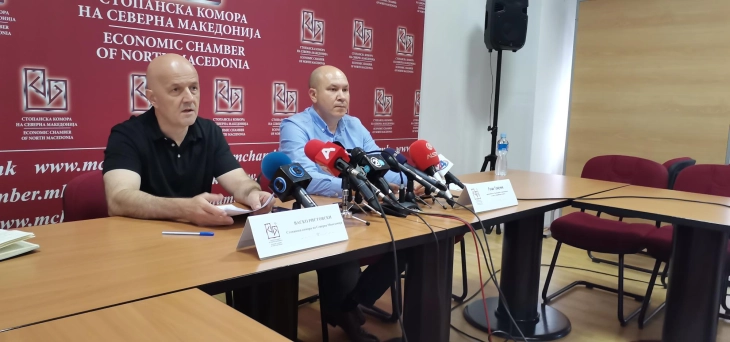Meat processing industry demands lower customs duties, equal treatment with importing companies
- The group of producers and processors of meat within the Economic Chamber demands that the Government reduces import duties for raw materials for meat processing and ensures the same treatment with importing companies, otherwise it announces shut down of facilities or relocating them to neighboring countries.
- Post By Nevenka Nikolik
- 15:03, 7 August, 2023

Skopje, 7 August 2023 (MIA) - The group of producers and processors of meat within the Economic Chamber demands that the Government reduces import duties for raw materials for meat processing and ensures the same treatment with importing companies, otherwise it announces shut down of facilities or relocating them to neighboring countries.
"We call on the Government to urgently enact another extension of the measure or some kind of a permanent legal solution to reduce the tariffs on frozen pork intended for processing and to urgently establish equal conditions of control and rules for all market participants, whether domestic or imported," Goce Trajchev, president of the group told a press conference on Monday.
He stressed that instead of measures and activities from the Government in order to improve conditions, domestic producers receive fines from the Food and Veterinary Agency, which controls domestic companies according to the domestic rules for additives, whereas the imports according to those valid in the neighboring countries or in the EU.
Vasko Ristovski from the Economic Chamber pointed out that the country's rules do not distinguish between natural and added phosphates, noting that in the EU and in the neighboring countries it is stipulated that no more than 0.5 should be added and no more than 0.3 should be natural phosphates in the processing of meat.
"In our country, we practically stick to that value of 0.5 all the time, but it is treated as total value. We have taken data on products from foreign companies which contain 0.57, 0.54 and this is regular in our country, however, a domestic company that has 0.51, 0.52 is being fined, entire product groups are being banned, etc., which we believe is not right," said Ristovski.
He pointed out that urgent amendments to the legal regulations are needed to save the industry, which is threatened by complete collapse.
"Representatives of the industry have already pointed out that the current customs duties in this industry have brought them to an extremely unequal position in relation to the import industries, especially compared to neighboring countries. Finished products from abroad enter with zero percent duties, while domestic processors pay 25 to 35 percent customs duty on raw materials when importing raw materials. Neighboring countries do not have a customs duty, except for Serbia, where it stands at 8 percent, which is a drastically lower customs duty than ours, and in principle, the biggest competition comes from there," Ristovski said.
An even bigger problem, he added, will be the Open Balkan initiative and the additional opening of borders for products from neighboring countries.
"In this way, companies are not only put in a situation to shut down their facilities, but also consider moving production outside the country," Ristovski pointed out.
He noted that three years ago, amid regular and normal economic conditions, the Government saw this problem faced by companies and adopted an autonomous measure for temporary free import of frozen pork for processing, which somewhat helped overcome the difficult situation with prices remaining at the same level. However, he added, the measure expired in June 2022 with the explanation that it could no longer be extended because CEFTA rules did not allow it.
In response to a reporter's question, Trajchev said that domestic meat processing companies have the capacity not only to satisfy the needs of the domestic market, but a serious capacity for export.
"We have production capacities to completely satisfy domestic needs, we also have free capacities for export. We don't have the same starting base. That's where the problem is. That's what our entire demand is all about. We do not have the same starting base, we do not have the same conditions to be able to work in that direction. Why? Because what we are looking for as a reduction in the customs duty is the same raw material that we buy from the same place in Europe as all our other neighbors buy it from, where most of the imports come from, when they import it to them for processing there the customs duties are between 6 and zero percent, and in our country they are over 20 percent," said Trajchev.
Photo: MIA







